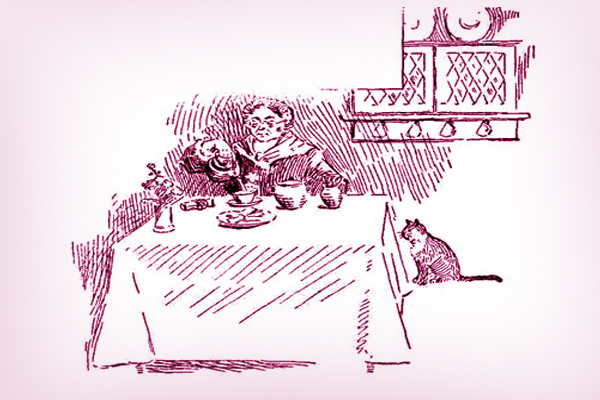Effects of Tea Drinking
Tea affects different people very differently. We find among the ordinary effects of tea-drinking:
Exhilaration:--an elevation of feeling, a lightness of mood or spirits; a cheerfulness or even joy, which is compatible with rest. This effect may be entirely independent of pure stimulus, or of any disposition to mental or physical activity.
Stimulation:--a quickening or rousing to action of any faculty, but as usually employed, an urging to action of bodily or mental powers.
Sustaining:--enabling one to continue the expenditure of energy with less sense of fatigue, at the time, or afterwards.
Refreshing:--relieving or reviving after exertion of any kind; reanimating, invigorating; contributing to rest after fatigue.
Exciting:--in the sense of stimulation of brain and nervous system to higher tension, but not necessarily attended by disposition to labor or useful activity.
Now some tea-drinkers find in the beverage exhilaration only, a lightness of mood, but they are disposed to rest and to revery, to simply a passive meditation, or an indulgence of the imagination.
Others are stimulated to mental or to physical activity, and are sustained during such action. Afterwards they are refreshed when fatigued, by the same beverage.
Others again are nervously excited and cannot rest or sleep; but are too "nervous," as they express it, to set about any formal task, especially of a mental character.
We have known tea-drinkers, too, who after a hard day's toil, could drink two or three cups of strong tea and lie down to sleep for the night as quietly as babes are expected to--but do not.
It must be evident that each person should observe the effects of tea upon himself or herself and be governed accordingly. Tea is a poison to some temperaments, and so are strawberries. Tea will cure a headache or may produce one; will dispose to rest or excite to action. We will sum then by conceding that all our quoted authorities are right in their conclusions, if limited to a limited class of tea-drinkers, and all are wrong, in a very broad application.
Theine (synonym for caffeine) is the one constant agency in the effects of tea. It is present in teas that are devoid of essential oils--so far as the senses go--and it then still refreshes, stimulates, sustains, and even exhilarates, by actual experiment.
The feeling of "comfort," attributed by some writers to the hot water of the tea, may be also enjoyed by drinking cold tea, which is no less refreshing in hot weather. The high-flavored essential oils (strictly oils which evaporate at very moderate temperatures) of Formosa teas seem to take part in the superior exhilarating or almost intoxicating effects of the choice varieties, but we have no certain proof of the fact; while the more intoxicating and stimulating, as well as deleterious, green teas possess very little, if any, of these pleasant oils.
It seems to be an authodox opinion among physiologists that tea contributes nothing towards support of the human system; that it only rouses it into action, an effect which should, consistently, be followed by corresponding reaction and depression, which plainly is not the case. This hypothesis leaves the enquiring layman in a dilemma. Tea must either enable the system to draw more heavily or more economically upon the resources afforded by recognized food, or it is itself nutriment. Otherwise, an established principle of physics--that there can be no expenditure of energy without correlative cost--would be subverted. As tea is admitted upon experience to be most useful, and most craved by mankind, where the supply of food is insufficient; and as it is known to refresh and sustain in large degree in the absence of any food whatever, there is fair ground for the opinion, however heterodox, that tea directly affords nutriment to the human organism, and, possibly, to the brain and nerves in particular, as with phosphoric acid.
Animal gelatine has been placed in the same class with tea by some scientists, and it is asserted that it conserves waste without itself entering into the substance of human tissue. It is an accepted physiological law that nothing taken as food or drink can support expenditure of human energy in sensible motion, in heat, or in the nervous waste of mental or emotional exercise without first being built up into living tissue; the breaking down or chemical decomposition of which tissue, and subsequent oxidation of less complex compounds or their constituents, is the direct source of bodily energy of every description. If tea and gelatine, and possibly some forms of alcohol, are to form exceptions to the law, the law no longer stands. But it would seem more reasonable to amend the hypothesis concerning exceptions, and bring them into line by admitting that they are nutritious in a manner not yet ascertained. All physiological laws are provisional, good until proved insufficient, and then to be amended in the light of accumulating facts.

Education
Many people benefit from knowledge and interesting facts...Did You Know?
When precipitation falls over the land surface, it follows various routes. Some of it evaporates, returning to the atmosphere, and some seeps into the ground (as soil moisture or groundwater). Groundwater is found in two layers of the soil, the "zone of aeration," where gaps in the soil are filled with both air and water, and, further down, the "zone of saturation," where the gaps are completely filled with water. The boundary between the two zones is known as the water table, which rises or falls as the amount of groundwater increases or decreases.
The water table is the top of the zone of saturation and intersects the land surface at lakes and streams. Above the water table lies the zone of aeration and soil moisture belt, which supplies much of the water needed by plants.
Throughout the hydrologic cycle, there are an endless number of paths that a water molecule might follow.

